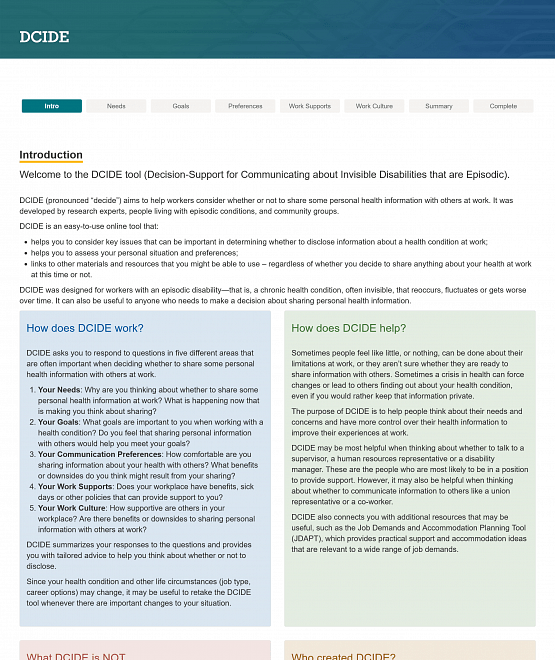The DCIDE Tool
DCIDE is a free tool that helps workers consider whether or not to share some personal health information or support needs with others at work.
About eight million Canadians live with limitations to their daily activities due to health or other conditions. These limitations – or disabilities – may be permanent and experienced every day, or they may be “episodic.” Episodic conditions are long-term health conditions, often invisible, where symptoms can re-occur, fluctuate, or worsen over time.
People living with disabilities are less likely to be employed than people without disabilities. They often have to give up work temporarily or permanently and can struggle to return to work.
It is important to remember that health conditions do not necessarily lead to a disability. A disability is when the social and physical environment creates barriers for persons with health conditions. In the workplace, that means that support and changes or modifications to some job tasks can remove the barriers that create a disability.
“Should I share information about my disability with others at my job?”
Deciding whether to talk about a health condition or supports and accommodations at work is a complex decision for people living with chronic health conditions. For most people, it means thinking not only about their health and any difficulties they may be having at work, but also about their goals, their personal preferences - and what their workplace is like when it comes to supporting workers with personal needs. People may also experience stress related to making this decision – regardless of whether that decision is to say nothing or to share some information about their health.
There isn't one right answer, and only the person living with a chronic health condition can make the choice that is best for them.
The DCIDE tool
The Decision-Support for Communicating about Invisible Disabilities that are Episodic (DCIDE) tool aims to help workers consider whether or not to share some personal health information or support needs with others at work. It was developed by research experts, people living with episodic conditions, and community groups.
DCIDE (pronounced “decide”) provides personalized guidance for people grappling with disclosure questions. It asks the user about key issues that are important to making a decision about sharing or not sharing health information in the workplace.
DCIDE is different from other communication tools:
- The questions were developed for and with people living with a wide range of health conditions who work in different types of jobs.
- Questions are organized into five key topics that are important to workplace disclosure decisions. You are provided a summary of your responses to each topic. The summaries are then collected into an overall summary of your personal situation and concerns.
- The DCIDE tool links to other materials and resources that provide concrete strategies and suggestions for support that you can try on your own without sharing any health information, as well as supports that others can help provide.
DCIDE and your privacy
DCIDE is available for your personal use and takes about 15 minutes to complete. It is free to use. You will not be asked for personal information, and your answers will not be saved or shared with others. You may save a copy of your summary document for your own use.
Free and anonymous
All ACED tools are available free of charge and are licensed under a Creative Commons Attribution-NonCommercial-NoDerivatives 4.0 International License. That means this tool can be used and shared as long as IWH is credited as the source, the information is not modified, and the information is used for non-commercial purposes. Read more here.
All information entered into the ACED tools is anonymous. We do not collect IP addresses or ask for identifying information such as names or emails. The responses to DCIDE or the JDAPT are stored for 72 hours to allow for users to save a draft and return within that time. The responses are not accessed or saved and are automatically deleted after 72 hours. See here for more information on the ACED Tools and your privacy.

